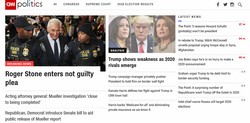In recent years, the American public has become increasingly skeptical of the media.
“Since the 2016 election skepticism of the media has been heightened, primarily because we see our president saying there is ‘fake news’ everywhere,” said Brittany Macaluso, Social Work major.
Macaluso believes that while his accusations are directed towards a specific platform, media consumers should be weary of all platforms because this statement is coming from the President.
However, these statements from Trump tend to arise when he is portrayed in a negative light by the media. It begs the question, does President Trump use the slogan “fake news” as a means of invalidating journalists, when they report on governmental wrongdoing?
The answer is most likely yes. The responsibility of journalists is to inform the public by being “watchdogs” of the government. The government is unable to censor the press as it would directly violate the first amendment. The constitution explicitly states: “Congress shall make no law… abridging the freedom of speech, or of the press” (U.S. Const., amend. I, 1791). The phrase “fake news,” is the only ammunition Trump has to discredit the media.
The self-regulating structure of the press, following ethics established by the Society of Professional Journalists (SPJ), is how the media maintains an effective relationship of checks and balances with the government. Ideally, this would ensure journalists’ ability to produce the truth.
Unfortunately, the press is not always able to regulate themselves. Modern news is often funded by private institutions, which have agendas that don’t necessarily hold with ethical journalism. Instead, journalists can be forced to produce biased news to the benefit of their parent corporations, who are driven by economic interests.
Although, there are still a few publicly funded news stations like NPR, that assume the watchdog role, there is no guarantee that they will be able to stay afloat much longer. The general public has become used to consuming media for free, with conglomerates picking up the slack by buying news outlets. So, to an extent, news stations have evolved to cater to an audience for views that generate revenue.
By not paying for news, we, American citizens, are hindering journalists’ ability to produce the truth. But what do we care? We haven’t lost anything of monetary value—just quality of information.
It is vital to understand that the media is doing their best to uncover truth in an era where the odds are against them. The president continues to shame reporters calling information they uncover “fake” and private companies own outlets, having authority over what is published. We live in a time where access to news is being taken for granted.
Rather than continuing a cycle of skepticism, it is time we start investing in the media. For example, paying for yearly subscriptions to newspapers or donating to stations like NPR. These actions ensure that reporters can serve the public, to a higher standard.
IMAGE TAKEN from CNN Politics




